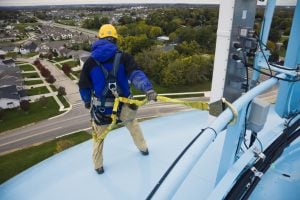Some thoughts on scaffold training:
User training is optional: OSHA requires that all scaffold users be trained in the awareness of certain hazards prior, that’s right, prior to getting on a scaffold. This training is to be provided by a qualified person. That would be somebody that knows about scaffolding. Well, actually that would be somebody that really does know something about scaffolding. This is important stuff. Believe it or not, all of us in the scaffold business rely on this training to keep scaffold occupants safe. This user training is a critical component of the overall training requirements that is expected of all participants. Is this concept, so excellently specified in the OSHA scaffold standards, effective? I don’t think so. And it isn’t because the standard isn’t written well or that it doesn’t “fit.” It’s because people don’t understand the importance of user training and worse yet, don’t seem to care about user training.
Wallet cards and certificates verify the scaffold training is adequate: It seems everybody wants one (or a million) of these things. For some reason, certain scaffold erectors like to have these things because they think that is what OSHA, safety managers, and bosses are looking for. Ask an erector if he has a wallet card and he gets all excited. Out comes the billfold and a zillion wallet cards to show that not only has he been trained but he has proof! It really doesn’t matter that he doesn’t know anything about scaffolding; he’s got the card. Remember, wallet cards are meaningless if the card holder cannot demonstrate a knowledge of scaffolding.
What makes a scaffold trainer qualified? The infamous wallet card may reveal a more sinister activity that is worse than a useless wallet card. It’s the trainer that doesn’t know what he/she is talking about. Certain trainers assume that since they know something about safety, that they are qualified to provide scaffold training. They may also assume that since they have a college degree, that they can teach anything. Others assume that since they have worked with scaffolding forever that qualifies them to provided scaffold training. Still others conclude that their affiliation with an organization automatically gives them the right to provide scaffold training. Nothing could be further from the truth. A qualified trainer is an individual who knows the subject matter and can accurately provide that information to the student.
Scaffold training automatically makes a person competent: Here’s another strange interpretation, if you will, of the training requirements. The student desires to become a “competent” person in scaffolding. (A variation on this theme is the “certified person”, whatever that is.) This potential student seeks out the training center that can offer this competent person training. Since the charlatans are delighted to fleece the ignorant, the so-called qualified trainer happily obliges for certain financial compensation. The trainer gets his money, the student becomes competent. Guess what? It doesn’t work that way. Training does not necessarily equal competency. A wallet card does not equal competency. Competency is demonstrated, not certificated. Besides, to be competent, you must have authority. That authority comes only from the employer. It does not come from the trainer (unless the boss is the trainer), nor does it come from OSHA.
Wallet cards are meaningless if the skill isn’t there: The training is meaningless if done by an unqualified instructor. Don’t get me wrong. A wallet card is handy to have to show the inquirer that you have had training. But the wallet card does nothing more. It certainly doesn’t give you knowledge, expertise, or experience. There is no magic here. You have to work at gaining knowledge and you have to work at being able to provide that knowledge to others. Reading the regulations in front of a group of people is not training. Being the foreman doesn’t automatically make you qualified to be a scaffold instructor. Being a scaffold company owner doesn’t qualify you either.
Scaffold training must be done by an OSHA certified instructor: There is no such person nor does OSHA require it. OSHA has not approved any individual to perform scaffold training. If someone tells you that he/she is OSHA certified, challenge this person for authentic documentation.
Scaffold training is required every year: This is not true. What is true is that scaffold training is required when the employee who will be using a specific scaffold is unfamiliar with that type of scaffold and/or is unfamiliar with the applicable OSHA standards. Training, or more accurately, retraining, is required whenever the employee forgets the training. For some workers, retraining may be required every day!
A scaffold competent person is required to know the OSHA scaffold standards: This is absolutely correct. How can you be a competent person if you don’t know what the expectations are? If you don’t know, for example, when fall protection is required, how would you ever know if the scaffold is safe? It’s ridiculous to declare a person competent if this individual doesn’t know the rules.
If you are looking for scaffold training, carefully screen the prospective trainer. Make sure he/she not only has the credentials, but knows the subject matter. If the trainer offers to make you a competent person as defined by OSHA, offers to make you certified, or tells you that he/she is OSHA approved, look for another trainer. If you offer training, make sure you know what you are talking about. Familiarity with OSHA regulations is only part of the qualifications to be a good trainer. Likewise, familiarity with scaffolding is only part of the qualifications. The Scaffold Industry Association offers training programs that encompass all aspects of a complete training program. Make use of these programs. Your life depends on it.












